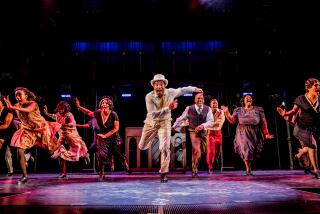STAGE REVIEW : REVIVED âPICNICâ OFFERS A MELLOW SPREAD
If William Inge were around to see the revival of âPicnicâ at the Ahmanson, heâd have one or two reservations, but, in the main, one suspects heâd be pleased.
It lives up to the spirit of the hugely successful Broadway version that opened in 1953 (a version Inge himself wasnât altogether wild about), if not entirely to its letter.
The discernible changes in the Ahmanson âPicnicâ are so minor as to be negligible. It is not âSummer Braveâ (an earlier version of âPicnic,â with a different ending). It is âPicnicâ slightly streamlined, but âPicnicâ as we know it: a mellow, Middle-American portrait in languid colors and vivid strokes, stemming from the authorâs strong ties to his subject and his eloquent affliction with its small-town preoccupations.
Director Marshall W. Mason is keenly aware of these values and the importance of placing them in the proper historical frame--re-creating the lethargy of the early â50s and of a small, unchanging Kansas town where boredom is both catalyst and killer. Already, the play is a period piece.
And it is still an affecting one.
The inhabitants of this prairie outpost are as familiar as they ever were: Flo (Rue McClanahan), the single mother who worries and rents rooms to bring up her two daughters--Madge (Jennifer Jason Leigh), the beauty, and Millie (Dana Hill), the brain; Rosemary (Michael Learned), the schoolteacher who rents a room from Flo and can no longer bear to hear the ticking of her biological clock; Howard (Dick Van Patten), the very small, very dull businessman Rosemary traps into marriage; Mrs. Potts next door (Conchata Ferrell), enslaved to her invalid mother; Madgeâs suitor, Alan (Tim Shelton), from the right side of the tracks, and Madgeâs downfall, Hal (Gregory Harrison), the drifter who steals away her heart.
With one pivotal exception, Masonâs company is able and keeps the play running at high pitch. Yet, there is a slickness to the production that blunts its emotional edges. Is it the patina of 33 years? A reverential gloss willfully--even subconsciously--painted on? Or is it the weakness at the core?
The weakness is the performance of Jason Leigh, who has the golden looks but not the stage presence for Ingeâs spirited Madge. Her portrayal is decorative but limp, and her vocal languor merely flat.
This takes the heart out of the love scenes between her and Harrison (a dark and brooding but animated Hal), neutering the outcome of the play. Itâs a serious loss.
Physically, the production is breathtaking. John Lee Beattyâs exquisite sets are more than American Gothic. Theyâre American fairy tale--a lazy yard between two houses of crumbling gingerbread, leaves on the ground, old trees, a swing, a picket fence.
For the picnic itself, the houses fall away to lock Madge and Hal in a gathering dark, slowly revealing the distant twinkle of carnival lights and a foreground bathed in moonlight--a moment for goose bumps, greatly enhanced by the prestidigitation of Dennis Parichyâs richly atmospheric lighting.
Part of the power of oneâs reaction to this landscape is the awareness that small-town America really still looks like that and that its imperviousness to time remains the paradoxical object of envy, fascination, nostalgia and frustration.
Madeline Ann Granetoâs costumes are equally on target, evoking the characters as accurately as the period, especially in the hairstyles and tacky-chic of Rosemaryâs schoolteacher friends (Beth Grant, Brady Rubin, Ellen Crawford)--a squealing bunch of retarded adolescents who still call each other âgirl,â stranded in lives they inhabit as strangers.
It is this power for precise derision, for probing inner desperation and depicting it unadorned, that makes Inge endure. Even flawed, even with a more upbeat ending than Inge himself had originally wanted (but agreed to), this Ahmanson âPicnicâ reminds us that few playwrights could look at pain as gently or as deep.
Performances at the Music Center run through May 24.
More to Read
The biggest entertainment stories
Get our big stories about Hollywood, film, television, music, arts, culture and more right in your inbox as soon as they publish.
You may occasionally receive promotional content from the Los Angeles Times.










